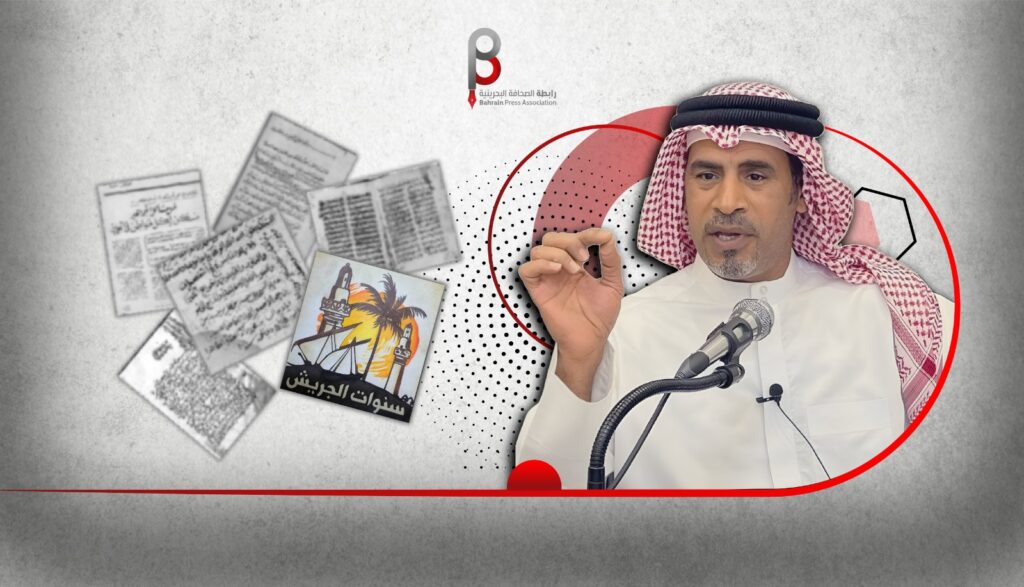Why does the Bahraini government prevent its citizens from writing about history?

Bahrain Press Association, Friday 17 November 2023, London, UK
On Friday, 10th November 2023, the Bahraini researcher and owner of the famous blog “The
Years of Jareesh” received a phone call requesting his appearance at the Criminal Investigation
Building of the Ministry of Interior, but the caller refused to disclose the reason. Al-Abbas went
to the designated building, and hours later, the Ministry of Interior issued a statement accusing
Al-Abbas of “challenging the religious and national foundations of Bahraini society and
disseminating false historical information that would stir up discord and threaten civil peace.”
Who’s Jassim Al-Abbas? And why are the Bahraini authorities pursuing him?
Jassim Al-Abbas, a young Bahraini with a passion for history, established a blog in 2008
dedicated to exploring various aspects of Bahrain’s history. His focus extends beyond the
content found in official history books, particularly emphasizing unrecorded historical events,
with a specific emphasis on the history of the Shiite community in Bahrain. He articulates the
concerns shared by a substantial portion of the Shiite sect, where numerous members feel that
their identity, history, and manuscripts are overlooked in mainstream history books and the
official narrative. Many members of this sect believe that Jassim’s research and writings serve
to resurrect a portion of their history deliberately omitted, as if consigned to oblivion by a
purposeful neglect in documentation.
After creating the blog, Jassim Al-Abbas discovered that he has become a target by
“unknowns.” His blog was hacked more than once, and he was eventually forced to shut it
down in order to safeguard its content from destruction and deletion. Following the 2011
events, Jassim created an “Instagram” account that attracted tens of thousands of followers
actively engaging with each new post. Some of the blog posts became hot topics for
conversation in popular gatherings and community discussions, and his writings also inspired
numerous citizens to share their own historical documents and manuscripts, unveiling materials
that might have otherwise remained unseen without his proactive initiative.
Al-Abbas’s activity outside the official paradigm angered the authorities that could not easily
prosecute him due to his adherence to historical readings and his avoidance of expressing any
political views. Nonetheless, the authorities summoned Jassim for interrogation on January 30,
2020, accusing him of “spreading false information.” He was held in detention for a week
before the authorities released him.
Following this incident, the Years of Jareesh blog was permanently taken offline and never
resurfaced on the Internet. The reasons for this action had not been officially declared, in what
is likely to be the result of successive pressures from official authorities during the interrogation
and detention. It could also be the price of his freedom and putting an end to his persecution.
Consequently, Jassim redirected his focus to posting on Instagram, where he has amassed over
300 thousand followers.
A few weeks ago, a video featuring Al-Abbas discussing historical narratives related to members
of the Shiite sect in the country gained widespread attention. The mention of this incident
angered the authorities, triggering an immediate online incitement campaign against him. Fake
accounts on social media began demanding legal actions be taken against him providing a
pretext for summoning and arresting him.
Although the sectarian dimension is undeniable in this incident, the true peril inherent in this
incident of summons and arrest in particular is the state’s adoption of a policy that aims to
obstruct and criminalize historical research and documentation of Bahrain in any form not
sanctioned by official government institutions. The threat here lies in the expansion of
repression campaigns to include other topics, not to mention commenting on the complexities
of political life in the country.
A little over a year ago, the authorities summoned the academic and researcher Nader Kadhim.
After detaining and interrogating him for days, he was dismissed from his position as a faculty
member at the University of Bahrain, and the authorities directed national libraries to retract
his books, some of which were funded by government agencies, with the majority holding
licenses from the Ministry of Information. This incident raised the alarm for many that the state
had initiated a new wave of repression. Unlike previous campaigns that predominantly targeted
individuals involved in politics or social activism, this latest crackdown extended its reach to
encompass non-opposition figures, particularly those dedicated to knowledge and academia.
These campaigns unequivocally affirm that the Bahraini authorities are persistently tightening
the restrictions on the remaining spaces of freedom available to Bahrainis. The state is
constantly attempting to keep citizens in a narrow frame depriving them of genuine freedom of
any sort. This situation is particularly worrisome for writers and researchers who now harbor
fears about undertaking any research or academic activities related to Bahrain’s history.
The authorities are called upon to immediately release researcher Jassim Al-Abbas, drop the
charges brought against him, and cease any harassment. Furthermore, they are called upon to
halt the persecution of citizens for their creative endeavors across all fields.